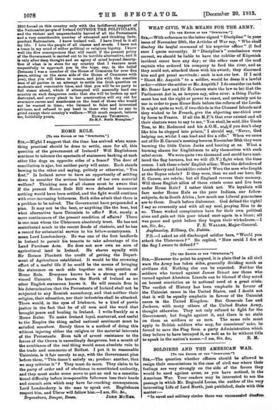HOME RULE.
[To TED Endros Or vas " SPICTITOR."3 SIR,—Might I suggest that the time has arrived when some- thing practical should be done to settle, once for all, this question of the government of Ireland? Will Englishmen continue to tolerate the spectacle of statesmen barking at each other like dogs on opposite sides of a fence P The door of conciliation is ajar, but neither party will enter. Each stands bowing to the other and saying, politely or otherwise, "You first." Is Ireland never to have an opportunity of settling down to consider the serious business of her own material welfare? Thinking men of all classes must be aware that if the present Home Rule Bill were defeated to-morrow nothing would have been settled, and the fight would continue with ever-increasing bitterness. Both sides admit that there is a problem to be solved. The Government have propounded a plan. It may not be the best, or anything like the best, but what alternative have Unionists to offer P Not, surely. a mere continuance of the present condition of affairs? There is one man whom the Ulstermen absolutely trust. He has not contributed much to the recent floods of rhetoric, and he has a record for substantial service to his fellow-countrymen. I mean Lord Londonderry. He was one of the first landlords in Ireland to permit his tenants to take advantage of the Land Purchase Acts. He does not now own an acre of agricultural land in Ireland. He shares equally with Sir Horace Plunkett the credit of getting the Depart- ment of Agriculture established. It would he-the crowning effort of a useful life if be could be the means of bringing the statesmen on each side together on this question of Home Rule. Everyone knows he is a strong and con- vinced Unionist. He knows the North of Ireland as no other English statesman knows it. He will remain firm in his determination that the Protestants of Ireland shall not be subjected to any Romish ascendency, and that neither their religion, their education, nor their industries shall be attacked. There would, in the eyes of Irishmen, be a kind of poetio justice in the fact that he of all men said the word that brought peace and healing to Ireland. I write frankly as a Home Ruler. To make Ireland loyal, contented, and useful to the Empire the thing called national sentiment must he satisfied somehow. Surely there is a method of doing this without injuring either the religion or the material interests of the Protestants. Even talk of armed resistance to the forces of the Crown is exceedingly dangerous, but a month of the semblance of the real thing would mean absolute ruin to the trade and commerce of Belfast. I put it to reasonable Unionists, is it fair merely to say, with the Government plan before them, "This doesn't satisfy us; produce another, that we may criticize it" P They must do more. They claim to be the party of order and of obedience to constituted authority, and they must make some move to put an end to a collet-Un- tional difficulty before irresponsible followers lose their beads and commit acts which may have far-reaching consequences. Lord Londonderry is the man to speak out. Englishmen respect him, and Ulster will follow him.—I am, Sir, &c.,










































 Previous page
Previous page